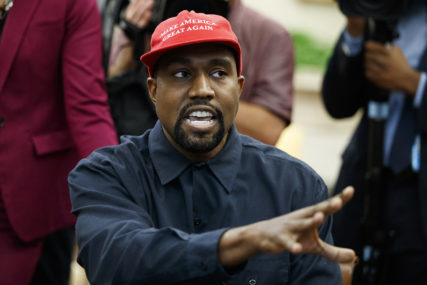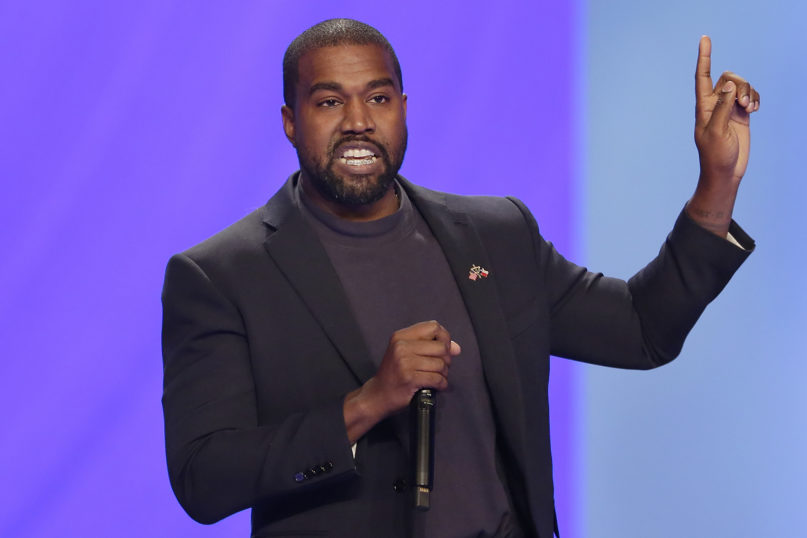(RNS) — Lest we forget amid the hurly-burly of the major parties’ conventions, Kanye West is running for president.
His campaign, which he announced July 4, could be dismissed as irrelevant: another plot twist in the increasingly bizarre annals of 2020, in which murder hornets run rampant and baby TikTok witches hex the moon.
But nothing is more emblematic of our age — not the unprecedented COVID times, but our present culture — than West’s presidential run, which is deeply rooted in both his Christian faith and his absurdly devout passion for self-promotion.
West’s wife, reality TV star Kim Kardashian, has expressed concerns about his mental health, given his publicly acknowledged diagnosis of bipolar disorder. But her husband’s campaign can’t be chalked up to mere mental instability any more than President Donald Trump’s can.
We can better understand Kanye’s ambition if we consider the rapper’s transformation from Billboard celebrity to public Christian. It’s hard to think of a rapper as likely to condemn abortion and premarital sex as he is to boast about his riches, as Kanye did in his first campaign rally. (He later apologized to Kardashian for intimating that the couple had considered terminating one of her pregnancies.) Even compared to Christian MCs such as Chance the Rapper — in the context of a presidential campaign — West’s approach to his Christianity appears subversive.
But in substance his Christian values are nothing if not traditional. His most recent concerts have been not at secular stadiums but at Christian youth festivals, such the mid-January “Strength to Stand” conference in Pigeon Forge, Tennessee. Last autumn, West released a new album, “Jesus Is King,” devoted to his newfound Christian faith. A month later he premiered his own Christian rock opera, “Nebuchadnezzar,” based on the biblical account of the Babylonian king who threw Daniel to the lions.

Musician Kanye West led a “Sunday Service” performance on a specially made hilltop stage at Coachella on Easter Sunday, April 21, 2019, in Indio, California. Video screenshot
In West’s latest interviews he has condemned pornography and strip clubs as forms of “sex trafficking” and announced that he forbade people working on his new album from engaging in premarital sex.
His lyrics now celebrate a vision of traditionalist family values: One 2019 song, “Closed on Sunday,” that has become a staple of his recent live performances exhorts listeners to be “Closed on Sunday/you my Chick-fil-A/Hold the selfies, put the ’Gram away Get your family, y’all hold hands and pray.”
Kanye’s search for high office may be able to tell us as much about our spiritual disillusionment as it can his mental health.
As more and more of Kanye’s fan base — millennials and Gen Z-ers — leave behind traditional organized religion, whether for outright atheism or the more nebulous ranks of the “spiritual but not religious,” Kanye’s brand of theologically orthodox and liturgically conservative forms of Christianity have become for many of them a form of resistance to the modern world. It’s not easy to tell whether the rebellion is really theological or ideological, or simply for its own sake.
For West, it hardly matters: Jesus, prominently displayed on his campaign’s website, is also front and center in its strategy. He seems to be running on the idea — itself unobjectionable — that America is spiritually as well as economically and politically broken. In this, his candidacy bears more than a few similarities to Democratic primary contender Marianne Williamson. Both Kanye and the author of “The Book of Miracles” urged a moral and spiritual revolution to counter the decay and degeneracy of contemporary consumer-capitalist culture.
It’s this that separates Kanye from Republican model of evangelically aligned politician. At his core, Kanye is a chaos candidate, not unlike Trump (or Williamson). West’s personal brand of self-promotion and self-deification (he frequently reminds us that he’s the “greatest artist who ever lived”) is threaded together with subversive populism and a kind of aesthetic absurdity.

Kanye West speaks during a meeting in the Oval Office of the White House with President Donald Trump, in Washington, Oct. 11, 2018. (AP Photo/Evan Vucci)
Like Trump, too, West frames himself as the candidate you vote for while thinking: What the hell, why not, things can’t get any worse. A political future predicated on the idea that any deviation from the status quo, however surreal or absurd, is desirable: not because it might improve existing institutions, but rather because it does away with them altogether.
But it’s useless to pretend that West is completely in the Trump mold either, perhaps explaining his break with Trump after donning a MAGA hat. Instead Kanye outdoes Trump at every turn: Even his hair is more transgressively orange.
By framing his counterculturalism in explicitly Christian terms, in terms far more grounded in sincere faith than Trump’s half-hearted conversion ever was, West renders his campaign a more fascinating contradiction. As a rapper, in addition, West’s embrace of religiosity is far more confounding: He rejects the very secular values on which his celebrity, and all our capitalist culture, is based. West at once condemns the spiritual emptiness of contemporary American culture and offers its apotheosis: a fusion of celebrity-helmed political order with Christianity as his platform, or maybe just a massive troll.
It’s hard not to root for West, as long as his chances are. He may not be the most competent or successful candidate, but he may be the one who tells America best about itself.






